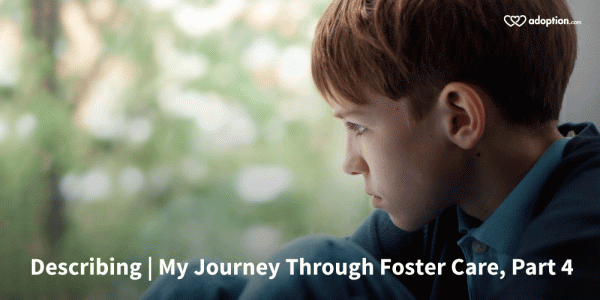Read Part 1 of this story, Separation, here. Read Part 2, Re-Placement, here. Read Part 3, Connectedness, here.
Have you ever tried to explain to someone a concept or experience that’s totally foreign to him or her?
How successful, for example, do you think an eagle will be relating the sensation of flying to the cypress that supports its nest? That particular eagle and cypress may have some history together, such as last winter’s snow, yesterday’s sunshine, or this morning’s thunderstorm. The two might even share a bright moment over some common experience and vocabulary, like the terror of hurricane force winds. No matter how hard they try, however, the best that cypress will be able to do is merely imagine the sensation of flying in the sky above its firmly grounded roots.
That’s the kind of laughable challenge I faced as a foster child and afterward when asked to describe the foster care experience. At that time there were such tremendous gaps in my vocabulary and knowledge base, and usually the listener’s ability to empathize, that I soon understood the futility of trying to accurately describe what I’d gone through. Instead, I learned to keep silent. When pressed I simply said what I thought the listener wanted to hear. Staying silent or lying are foster care survival skills best never learned, because both are so much work to unlearn.
How might I describe the totally foreign experience of foster care to someone now? There aren’t many gaps in vocabulary or knowledge base these days, enough time has passed that I can speak from more than just emotion or through tears, and if you’re reading this I assume you lean toward being empathic. So I’ll answer here as if speaking to the person most likely to ask—a trained professional such as a social worker, psychologist, psychiatrist, and the like. Let’s go!
From my foster care experience and its aftermath was born and nurtured a soul-scorched apathy and universal loathing that would take me the better part of 20 years of hard work to dismantle and replace with a high-functioning normalcy. I don’t recall receiving any counseling or psychological diagnoses related to my foster care experience. Truthfully, during the early years I doubt I would have been a willing participant to any counseling.
Psychologically, my experience taught me that authority was capricious and arbitrary, since authority seemed to swoop down and move me from one placement to another on a whim. Emotionally, my experience taught me that I had no right to be comforted, since comfort was so rarely available. Relationally, my experience taught me that it was too painful to try to connect with another person, since I knew I could be gone the next day and would certainly be gone soon. Spiritually, the constant relocations instilled in me a calcified sense of rejection. Surely the relocations equated to rejection, so I must be irreversibly rejected by everyone, including the Creator (if there was one). At least, that’s how I reasoned at the time.
Speaking more specifically to the mental health professionals, if a psychological diagnosis were done during my late teenage years, I suspect it would have identified a major depressive disorder, panic attacks, and generalized anxiety disorder (DSM-IV Axis I); a personality disorder not otherwise specified as a combination of histrionic, avoidant, and dependent disorders related to rejection, inadequacy, and approval seeking (DSM-IV Axis II); no medical problems (DSM-IV Axis III); problems with primary support group, removal from home, disruption of family by separation, estrangement, and inadequate discipline (DSM-IV Axis IV); and a GAF of not greater than 45.
By age sixteen I acquired a crushing fear as I perceived I wasn’t equipped or prepared for an adulthood that looked any better than my childhood. This fear pushed me to finish high school a year early, devour every self-help book I could find, and work my way through college. Almost as clearly as I remember the day I started foster care, I remember the day that I realized I might be free of this crushing fear.
While driving in some Midwest state on a business trip, I started to pass a white car with a black seal on the driver’s side door. Although I felt that familiar wave of anxiety engulf me, I didn’t panic. As I passed that car, I caught a glance of the scared boy crouched in the back seat.
Like eagles signaling midair, by the look in his eyes, I knew instantly the pain of his loneliness. He wouldn’t have to explain his suffering to me even if I could hear him. Like the cypress watching the eagle fly, however, I don’t think he could tell by the look in my eyes the hurricane force pain I saw heading his way. He wouldn’t understand even if he could hear me, which was probably best for him anyway.

